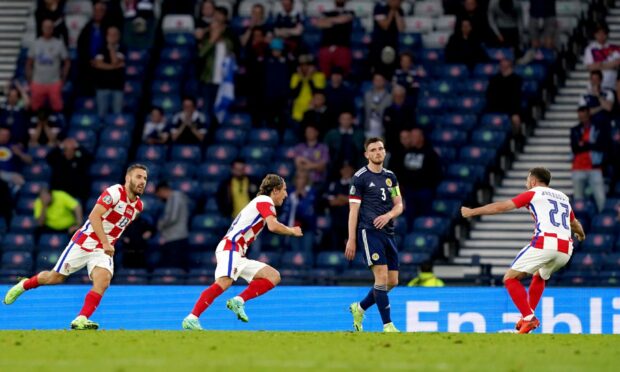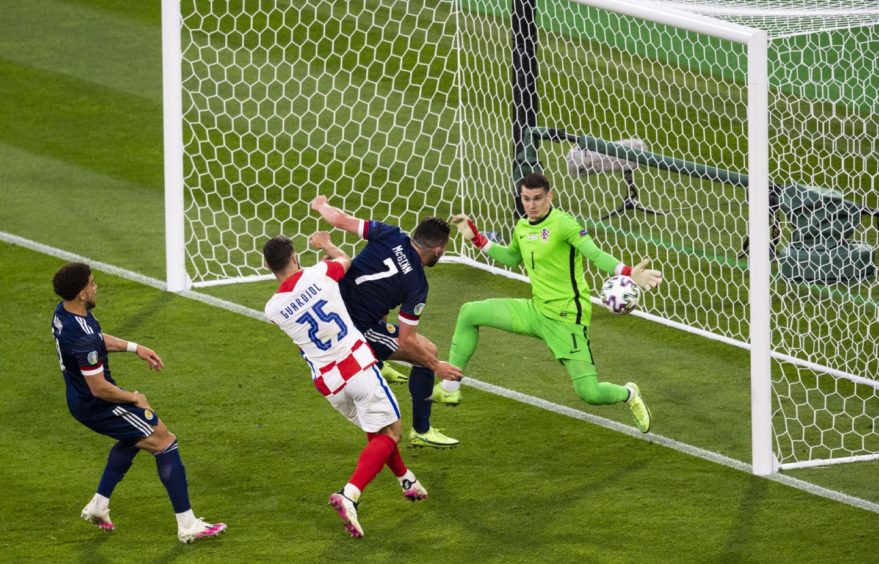In the end, it was all too predictable as Scotland’s Euro 2020 campaign went the same way as each of their previous appearances at a finals tournament.
It was always going to be an uphill struggle after the opening defeat to the Czech Republic, but the outstanding showing at Wembley gave us hope and a clear path to the knock-out stages, only for Croatia to outplay the Scots and puncture a nation’s hopes and dreams.
With two of the games at Hampden and a group which was eminently navigable, this was Scotland’s best ever chance to make history, and the eventual outcome was hugely disappointing.
The display in London could only have been bettered by the team scoring a goal, but the performance level against the Croats dipped alarmingly.
We stood off them, and if you give time and space to quality players like Modric, Brozovic and Kovacic, there is only ever going to be one outcome.
The team rightly attracted much praise for qualifying for the finals, and the warm-up matches suggested this was a squad ready to compete, but when the chips were down the players failed to meet our expectations and some of the star names never quite hit the heights.
The absence of Billy Gilmour from the final game was a cruel blow, and he might have made a difference in that decider, but the big problem throughout was the Scots’ lack of a killer touch.
In all three matches there were clear opportunities to score. In some of them we were denied by last ditch defending or the woodwork, but in most cases the issue lay in a lack of composure or confidence at key moments.
We have quality in depth across most areas of the side, but not up front. Lyndon Dykes and Ché Adams have both shown promise but have not delivered the goals we need, while the only other realistic option, Kevin Nisbet, simply has not been given enough time on the pitch.
It is by no means a concern unique to Steve Clarke, his predecessors suffered similarly, but it is one he is going to have to resolve if the national team is to build on its resurgence in recent times.
Over the piece there is still good reason to be optimistic, but Scotland are going to have to get off to a flier when the World Cup qualifying campaign resumes. Given that it does so with a trip to Copenhagen to take on runaway group leaders Denmark, that will not be easy.
As the Scottish players head off to enjoy a brief summer break, the tournament continues, and it has the potential to be one of the best Euros finals we have seen.
There are the obvious favourites, but the competition is so open it is very difficult to confidently predict who will prevail, with the round of 16 throwing up some mouth-watering match-ups.
There is an unbalanced look to the draw with the possibility of Belgium, Italy, France and Spain coming through in the top half and the genuine prospect of a lesser fancied nation making a real run in the bottom.
I expect more exciting, attacking football and cannot wait to see how it all pans out.
One step closer to normality
There was encouraging news this week with the roadmap to some kind of normality outlining that by mid-July 2,000 fans will be allowed inside football stadiums.
For many clubs in this country, that means every supporter will be able to attend, while for the Dons it at least allows some loyal season ticket holders to finally see the players in the flesh again.
If all goes to plan, by the third round of Premiership fixtures most restrictions will have been lifted, and the game against Ross County at the end of August could be the first at Pittodrie with a full turnout since March 2020.
That will come as a massive relief for Dave Cormack and his board who have had to perform all sorts of financial manoeuvres to keep the club operating.
I am sure a number of fans have been holding off from buying their tickets until they know what the future holds, others will be doing so in the hope of some exciting new names being brought in.
Hopefully there will be some movement on that front in the coming weeks.


